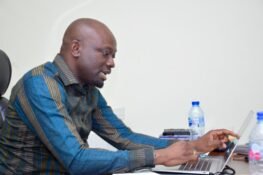Judith Yop Pam-Tok is the Chief Responsibility Officer, of 2FAFII Clothiers Ltd, an Abuja-based fashion brand that specialises in ready-to-wear clothing for women and children. She shares her story:
You started 2FAFII about 20 years ago. How has it been?
I started the fashion business in 1995. We were first registered with the CAC in 1997 as a business name called First Choice Designs, then I abandoned that and changed to Judith’s collection two years down the line.
I operated the business under that name until 2011 when out of the need to rebrand, 2FAFII was then registered as a limited liability company with the CAC. So technically that makes us 24 years in business.
What were you doing before then?
I started the fashion business as I came right out of the Polytechnic (Kaduna Polytechnic) in 1994 with a diploma in fashion designing. So, I was not doing anything before then apart from being a student.
At what point did you decide that 2Fafil was it for you and why?
I decided rather early (from secondary school) that I wanted to be a fashion designer. I was inspired by my clothing and textile teacher who is British.
She made the subject interesting hence it became one of my favourite subjects. I’d say the why is the passion I have in creating beautiful apparels from sheets of fabric.
How lucrative is the fashion business in Abuja, in particular and Nigeria, generally?
Aside from food, and oil, I think fashion is the next lucrative business anyone can do. Nigerians are fashion crazy and we have our large population to our advantage.
Fashion is a multi billion dollar industry world over, so a good place for anyone to be. Abuja, as Nigeria’s capital, happens to be the next best place for any designer in Nigeria after Lagos, because it is mostly a middle-high class city.
Can you tell us more about your Waste to Wealth Initiate?
Having been in business for almost two decades, I was almost getting choked with pieces of fabrics other wise called waste which I had hoarded over the years.
I personally didn’t need these fabrics, but desperately wanted to let them go in a good way, hence the birth of the waste to wealth initiative.
My younger sister and I got a few women in Heipang, Jos, trained them in basic sewing using these pieces and as soon as they learnt, they began to earn on each dress (mostly children’s wears) they produced.
By November of 2017, eight women had produced 1600 items of clothing. We held charity sales at the NAF Conference centre in Kado Abuja, November 18, 2017, where we invited the general public and 13 charities.
Our guests bought the clothes at N1000 per piece and donated them to the invited charities.
Aside from food, and oil, I think fashion is the next lucrative business anyone can do. Nigerians are fashion crazy and we have our large population to our advantage
How many women have you been able to empower with this initiative?
First of all permit me to thank the CBN Africa that made this dream of having our centre a possibility.
We have always had a small shop we managed over the years, but as a result of the charity fair we organised in 2017 the CBN Africa was highly impressed and asked to support the centre by providing equipment.
They kept their promise and that is why the commissioning is possible.
What are your expectations of your first centre which will be commissioned in Heipang, Jos next month?
As for my expectations for the centre, if we could do the much we did with almost nothing, and no proper accommodation, you can only imagine what this centre will help us achieve.
More and more women are getting interested in joining the initiative so I believe even the sky will be our spring board.
What are the three most valuable lessons you learnt running 2Fafil in the last 20 years?
I have learnt Patience, doggedness and that one should not limit oneself.
What specific advice would you have for a young woman who would like to become a fashion entrepreneur today?
Don’t limit yourself, be very open to learning be innovative.
Never ever take your customer’s for granted. Keep your books (records) clean. Helps you track your progress.
What are some of the things you know about running a fashion business today that you wish you knew when you were starting out?
Book keeping, not like I didn’t know the importance, but I was lazy and non-chalant, running my business for many years without keeping track of my progress.
What are your plans for the future?
I wish to see 2Fafil become a renowned ready to wear fashion brand that caters to the fashion needs of children, while expanding our initiative (which is our corporate social responsibility) to many more rural communities








